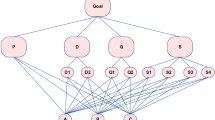Abstract
Standard theories of expected utility require that preferences are complete, and/or Archimedean. We present in this paper a theory of decision under uncertainty for both incomplete and non-Archimedean preferences. Without continuity assumptions, incomplete preferences on a lottery space reduce to an order-extension problem. It is well known that incomplete preferences can be extended to complete preferences in the full generality, but this result does not necessarily hold for incomplete preferences which satisfy the independence axiom, since it may obviously happen that the extension does not satisfy the independence axiom. We show, for incomplete preferences on a mixture space, that an extension which satisfies the independence axiom exists. We find necessary and sufficient conditions for a preorder on a finite lottery space to be representable by a family of lexicographic von Neumann–Morgenstern Expected Utility functions.
Similar content being viewed by others
Notes
See (Fishburn 1988, p. 11).
See (Luce and Raiffa 1957, p. 27) for objections against Archimedeaness
The upper and lower contour sets are closed and the upper and lower contour sets corresponding to the asymmetric part of the preorder are open.
Note that the Archimedean axiom exhibited by Dubra is stronger than the usual Archimedean axiom of the theory of expected utility.
The structure-preserving mappings of Abelian groups, their homomorphisms in other words, are analogous to linear mappings of mixture space.
As noted in the introduction, the problem of extending a preference relation that satisfies the independence axiom on a mixture space is closely related to the problem of extending a translation invariant preorder. Normality for mixture spaces is analogous to being unperforated for groups.
For ease of exposition.
cf. Blume et al. (1989).
In this case, normality for the symmetric part of the relation \(\succsim \) states that
$$\begin{aligned} \forall p,q,r\in S,\,\forall \alpha \in (0,1),\,\alpha p+(1-\alpha )r = \alpha q+(1-\alpha )r \Rightarrow p = q.\end{aligned}$$which is equivalent to say that for any \(\alpha \in (0,1)\), for any \(p\in S\), the map \(q\mapsto \alpha p+(1-\alpha )q\) is injective. This property is taken as an extra axiom by Mongin (2001) as he works with mixture sets without order relations. A mixture space S with the latter property is isomorphic to a convex subset of some linear space (Mongin 2001, Proposition 1).
If S is finite, the process will terminate.
References
Aumann, R. (1962). Utility theory without the completeness axiom. Econometrica: Journal of the Econometric Society, 445–462.
Baucells, M., & Shapley, L. S. (2008). Multiperson utility. Games and Economic Behavior, 62(2), 329–347.
Blume, L., Brandenburger, A., & Dekel, E. (1989). An overview of lexicographic choice under uncertainty. Annals of Operations Research, 19(1), 229–246.
Blume, L., Brandenburger, A., & Dekel, E. (1991). Lexicographic probabilities and equilibrium refinements. Econometrica: Journal of the Econometric Society, 81–98.
Chipman, J. S. (1971). Non-archimedean behavior under risk: an elementary analysiswith application to the theory of assets. Chipman et al, 289–318.
Dubra, J. (2011). Continuity and completeness under risk. Mathematical Social Sciences, 61(1), 80–81.
Dubra, J., Maccheroni, F., & Ok, E. A. (2004). Expected utility theory without the completeness axiom. Journal of Economic Theory, 115(1), 118–133.
Encarnacion, J., Jr. (1964). Constraints and the firm’s utility function. The Review of Economic Studies, 113–120.
Evren, Ö. (2008). On the existence of expected multi-utility representations. Economic Theory, 35(3), 575–592.
Ferguson, C. (1965). The theory of multidimensional utility analysis in relation to multiple-goal business behavior: A synthesis. Southern Economic Journal, 169–175.
Fishburn, P. (1988). Nonlinear preference and utility theory. Johns Hopkins Series in the Mathematical Sciences. Wheatsheaf Books.
Fishburn, P. C. (1971). A study of lexicographic expected utility. Management Science, 17(11), 672–678.
Fishburn, P. C. (1982). The foundations of expected utility. : Theory & Decision Library.
Galaabaatar, T., & Karni, E. (2012). Expected multi-utility representations. Mathematical Social Sciences, 64(3), 242–246.
Hausner, M. (1952). Multidimensional utilities. Technical report, DTIC Document
Herstein, I. N., & Milnor, J. (1953). An axiomatic approach to measurable utility. Econometrica, 21(2), 291–297.
Kreps, D.M., & Ramey, G.(1987). Structural consistency, consistency, and sequential rationality. Econometrica: Journal of the Econometric Society, 1331–1348.
Luce, R. D., & Raiffa, H. (1957). Games and decisions: introduction and critical survey. Mineola: Courier Dover Publications.
Mandler, M. (2005). Incomplete preferences and rational intransitivity of choice. Games and Economic Behavior, 50(2), 255–277.
Mongin, P. (2001). A note on mixture sets in decision theory. Decisions in Economics and Finance, 24(1), 59–69.
Ok, E. A., Riella, G. (2013). Fully preorderable groups.
Ok, E. A., Ortoleva, P., & Riella, G. (2012). Incomplete preferences under uncertainty: Indecisiveness in beliefs versus tastes. Econometrica, 80(4), 1791–1808.
Schmeidler, D. (1971). A condition for the completeness of partial preference relations. Econometrica (pre-1986), 39(2), 403.
von Neumann, J., & Morgenstern, O. (1944). Theory of games and economic behavior. Princeton: Princeton University Press.
Acknowledgments
D. Borie thank Efe Ok, Raphaël Giraud, the two anonymous referees and the coordinating editor of this journal for their helpful comments.
Author information
Authors and Affiliations
Corresponding author
Rights and permissions
About this article
Cite this article
Borie, D. Lexicographic expected utility without completeness. Theory Decis 81, 167–176 (2016). https://doi.org/10.1007/s11238-015-9523-y
Published:
Issue Date:
DOI: https://doi.org/10.1007/s11238-015-9523-y




